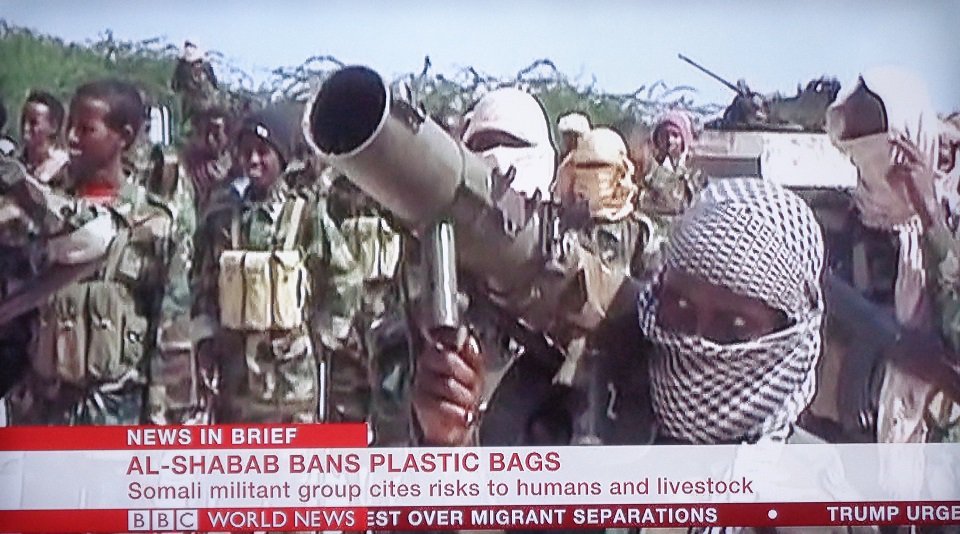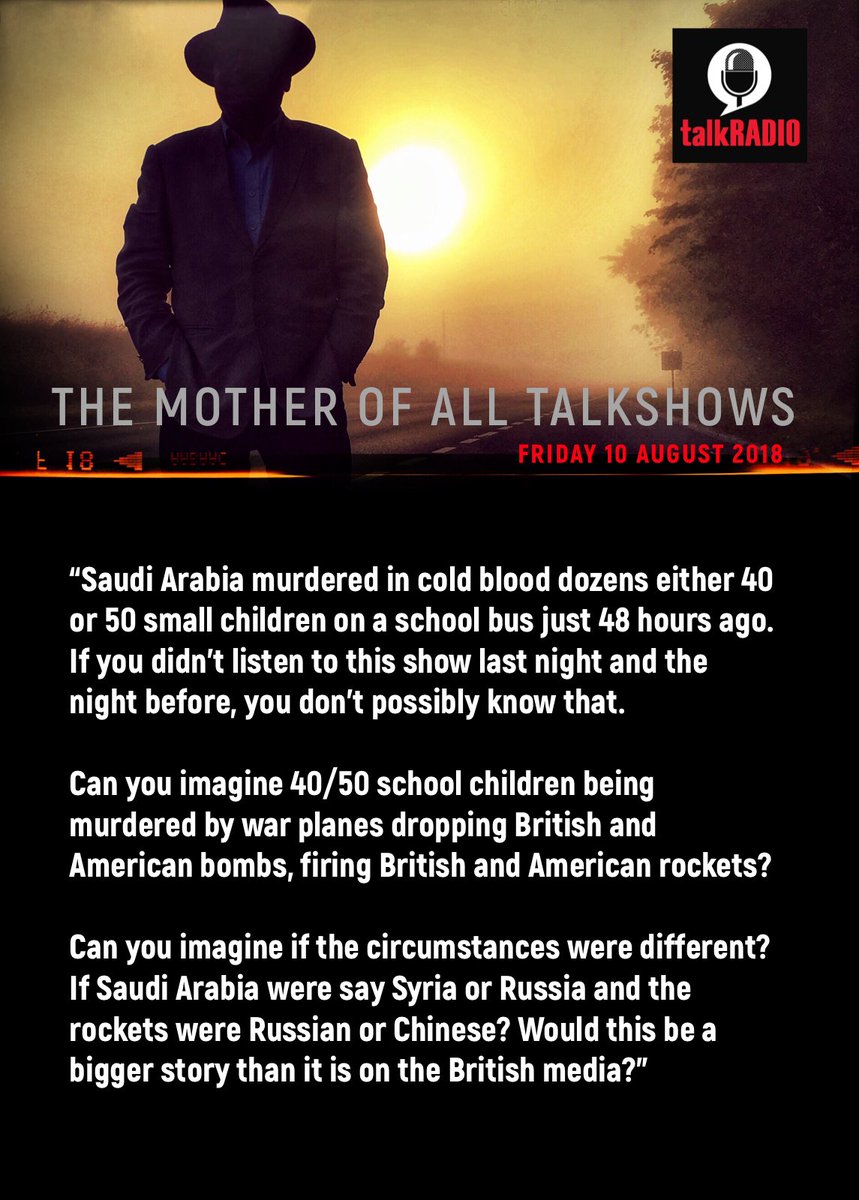Destes ninguém vai sentir falta.wagnerm25 escreveu: Sex Jun 29, 2018 3:59 pm #BREAKING - First pictures of #ISIS members executed today. International community helped #Iraqi courts establish video, photographic and battlefield evidence against ISIS members complicit in slaughter of #Iraqi civilians. 13 ISIS members on death-row were executed today.

Mundo Árabe em Ebulição
Moderador: Conselho de Moderação
- EDSON
- Sênior

- Mensagens: 7303
- Registrado em: Sex Fev 16, 2007 4:12 pm
- Localização: CURITIBA/PR
- Agradeceu: 65 vezes
- Agradeceram: 335 vezes
Re: Mundo Árabe em Ebulição
- wagnerm25
- Sênior

- Mensagens: 3590
- Registrado em: Qui Jan 15, 2009 2:43 pm
- Agradeceu: 83 vezes
- Agradeceram: 198 vezes
Re: Mundo Árabe em Ebulição
Houthi Rebels In Yemen Have Technical Trucks Armed With Vulcan Cannons
http://www.thedrive.com/the-war-zone/22 ... an-cannons

http://www.thedrive.com/the-war-zone/22 ... an-cannons

- EDSON
- Sênior

- Mensagens: 7303
- Registrado em: Sex Fev 16, 2007 4:12 pm
- Localização: CURITIBA/PR
- Agradeceu: 65 vezes
- Agradeceram: 335 vezes
Re: Mundo Árabe em Ebulição
O Departamento de Estado Americano mente, mente, mente e fica por isto mesmo. Estamos aqui e querermos mandar nesta porra toda quer gostamos ou não. E é isso!!!
- P44
- Sênior

- Mensagens: 55905
- Registrado em: Ter Dez 07, 2004 6:34 am
- Localização: O raio que vos parta
- Agradeceu: 2956 vezes
- Agradeceram: 2647 vezes
- cabeça de martelo
- Sênior

- Mensagens: 41277
- Registrado em: Sex Out 21, 2005 10:45 am
- Localização: Portugal
- Agradeceu: 1235 vezes
- Agradeceram: 3161 vezes
Re: Mundo Árabe em Ebulição
A bubbling Islamist insurgency in Mozambique could grow deadlier
Terrorists have torched villages and carried out a spate of atrocities

RESIDENTS of Naunde village were woken by gunshots at around 2am on June 5th. Two of the attackers carried guns. The other three, armed with machetes, set houses on fire. Then they chased down a local chief and hacked off his head in front of horrified neighbours. They also killed six others, including an Islamic leader whom they beheaded in a mosque.
The attack, documented by Human Rights Watch, a pressure group, is one of several dozen carried out by jihadists in Cabo Delgado—a mostly Muslim, coastal province in Mozambique’s far north—since October 2017. Recently many have followed a similar pattern: hit-and-run raids during which attackers torch houses, steal supplies and behead victims. In May terrorists decapitated ten people, including children. Officials have tried to brush off the violence as mere banditry. But the attacks appear to be increasing.
Who the killers are and what they want is not entirely clear. Uncertainty surrounds even their name. They are known as Ahl al-Sunnah wal-Jamaah (Arabic for “followers of the prophetic tradition”), though locals also refer to them as al-Shabab (“the youth”). They have no known ties to the jihadist group in Somalia, which is also called al-Shabab, but some researchers think the jihadists in Mozambique have received training abroad.
Beyond touting a strict form of Islam, the group’s political agenda is rudimentary. According to Joseph Hanlon of the London School of Economics, Ahl al-Sunnah wal-Jamaah emerged when groups of street traders, united by economic frustration and radical Islam, came together in 2015. They urged people not to pay taxes or send their children to state schools—and they stormed into mosques, knives waving, to lambast local Islamic practices.
For years locals complained about the growing number of angry young men in their midst. But Mozambique’s corrupt and listless authorities did little. The group’s first attack, last October, took officials in the capital, Maputo, by surprise.

Cabo Delgado should be booming. Companies such as Anadarko and Eni are investing some $50bn (around four times Mozambique’s annual GDP) in the region to exploit gas reserves found in 2010. Gemfields, a British firm that makes gem-encrusted eggs, arrived in 2011 to mine what is said to be the world’s biggest ruby deposit.
But locals say they have seen little benefit. Cabo Delgado still lags behind Mozambique’s more prosperous south. Many of the jobs created by the gas finds go to highly skilled expatriates, not to locals, who are mostly illiterate. Young people in Palma, a town at the centre of the gas projects, protested in May, claiming that their job applications are ignored.
Adding to the misery are reports of ruby-related land grabs. In London lawyers are pursuing cases against Gemfields on behalf of over 100 small-scale ruby miners, who claim they were shot at, beaten up and sexually abused by police officers and the company’s security guards.
Ahl al-Sunnah wal-Jamaah is not expected to hamper the region’s gas projects. But what happens next may depend on the state’s reaction. So far it has beefed up security and arrested hundreds of suspected jihadists. Eric Morier-Genoud of Queens University Belfast compares Cabo Delgado to north-east Nigeria during the early days of Boko Haram. There a heavy-handed crackdown helped transform a radical religious sect into one of Africa’s deadliest terror groups. The hope is that northern Mozambique does not go the same way.
https://www.economist.com/middle-east-a ... w-deadlier
Terrorists have torched villages and carried out a spate of atrocities

RESIDENTS of Naunde village were woken by gunshots at around 2am on June 5th. Two of the attackers carried guns. The other three, armed with machetes, set houses on fire. Then they chased down a local chief and hacked off his head in front of horrified neighbours. They also killed six others, including an Islamic leader whom they beheaded in a mosque.
The attack, documented by Human Rights Watch, a pressure group, is one of several dozen carried out by jihadists in Cabo Delgado—a mostly Muslim, coastal province in Mozambique’s far north—since October 2017. Recently many have followed a similar pattern: hit-and-run raids during which attackers torch houses, steal supplies and behead victims. In May terrorists decapitated ten people, including children. Officials have tried to brush off the violence as mere banditry. But the attacks appear to be increasing.
Who the killers are and what they want is not entirely clear. Uncertainty surrounds even their name. They are known as Ahl al-Sunnah wal-Jamaah (Arabic for “followers of the prophetic tradition”), though locals also refer to them as al-Shabab (“the youth”). They have no known ties to the jihadist group in Somalia, which is also called al-Shabab, but some researchers think the jihadists in Mozambique have received training abroad.
Beyond touting a strict form of Islam, the group’s political agenda is rudimentary. According to Joseph Hanlon of the London School of Economics, Ahl al-Sunnah wal-Jamaah emerged when groups of street traders, united by economic frustration and radical Islam, came together in 2015. They urged people not to pay taxes or send their children to state schools—and they stormed into mosques, knives waving, to lambast local Islamic practices.
For years locals complained about the growing number of angry young men in their midst. But Mozambique’s corrupt and listless authorities did little. The group’s first attack, last October, took officials in the capital, Maputo, by surprise.

Cabo Delgado should be booming. Companies such as Anadarko and Eni are investing some $50bn (around four times Mozambique’s annual GDP) in the region to exploit gas reserves found in 2010. Gemfields, a British firm that makes gem-encrusted eggs, arrived in 2011 to mine what is said to be the world’s biggest ruby deposit.
But locals say they have seen little benefit. Cabo Delgado still lags behind Mozambique’s more prosperous south. Many of the jobs created by the gas finds go to highly skilled expatriates, not to locals, who are mostly illiterate. Young people in Palma, a town at the centre of the gas projects, protested in May, claiming that their job applications are ignored.
Adding to the misery are reports of ruby-related land grabs. In London lawyers are pursuing cases against Gemfields on behalf of over 100 small-scale ruby miners, who claim they were shot at, beaten up and sexually abused by police officers and the company’s security guards.
Ahl al-Sunnah wal-Jamaah is not expected to hamper the region’s gas projects. But what happens next may depend on the state’s reaction. So far it has beefed up security and arrested hundreds of suspected jihadists. Eric Morier-Genoud of Queens University Belfast compares Cabo Delgado to north-east Nigeria during the early days of Boko Haram. There a heavy-handed crackdown helped transform a radical religious sect into one of Africa’s deadliest terror groups. The hope is that northern Mozambique does not go the same way.
https://www.economist.com/middle-east-a ... w-deadlier
- EDSON
- Sênior

- Mensagens: 7303
- Registrado em: Sex Fev 16, 2007 4:12 pm
- Localização: CURITIBA/PR
- Agradeceu: 65 vezes
- Agradeceram: 335 vezes
Re: Mundo Árabe em Ebulição
Vamos deixar avisado: ' A Rússia esta avisando uma provocação química na província de Idilib e o suposto ataque sera perpetrado por Assad.". Bem todos nós sabemos que Assad gosta de gases venenosos incluso ai em reuniões ele fica peidando o tempo todo como uma espécie de provocação.
[
[
Bloomberg: US warns Russia of new strike on Syria if Assad uses chemical weapons
World August 25, 6:34 UTC+3
The warning was conveyed by National Security Adviser John Bolton to his Russian counterpart, Nikolai Patrushev, during their Thursday’s meeting in Geneva
Share
3
NEW YORK, August 25. /TASS/. The United States has warned Russia that it would be ready to strike Syria again if President Bashar Assad and his government use chemical weapons in the country, the Bloomberg news agency said on Friday citing own sources.
According to the agency’s sources, the warning was conveyed by National Security Adviser John Bolton to his Russian counterpart, Nikolai Patrushev, during their Thursday’s meeting in Geneva, Switzerland.
The agency says that Washington "has information that Syrian President Bashar al-Assad may use chemical weapons as he seeks to recapture one of the country’s last rebel-held areas" - in the northwestern Syrian province of Idlib.
During the talks with Patrushev, Bolton said the United States would respond with stronger military action that it has used in Syria in the past - in 2017 and 2018.
The sides also discussed possible withdrawal of US servicemen from the military base on the border between Syria and Iraq, and prospects of their cooperation with Russian forces, deployed nearby. According to the agency, no agreement was reached on this issue.
Besides, the United States also rejected Moscow’s proposal to freeze the introduction of sanctions on Iran as part of a broader Syrian settlement plan.
A number of non-government organizations, including the White Helmets, alleged that a chemical weapons attack had taken place in Eastern Ghouta’s town of Douma on April 7. The Russian Foreign Ministry slammed this allegation as a bogus story, while Russia’s Defense Ministry pointed out that the White Helmets were known for spreading fabricated news. On April 9, officers from the Russian Center for Reconciliation of the opposing sides in Syria visited Douma but did not find any traces of chemical weapons. The United States, Britain and France used the rumors of the incident as a pretext to deal a massive air strike on Syria without approval from the UN Security Council on April 14.
On April 7, 2017, US President Donald Trump ordered a strike on the Shayrat air base. The attack, involving 59 Tomahawk Land Attack Missiles, came as a response to the alleged use of chemical weapons in the Idlib Governorate on April 4. Damascus dismissed those accusations, based on testimony by the White Helmets organization.
More:
http://tass.com/world/1018618





